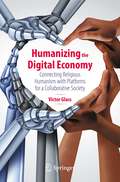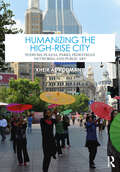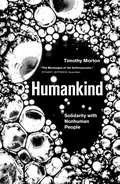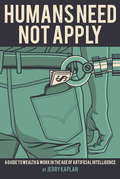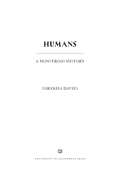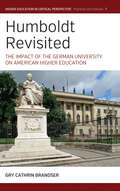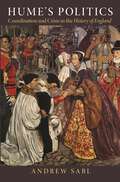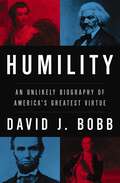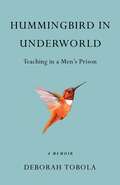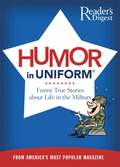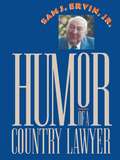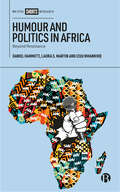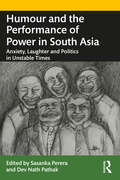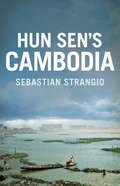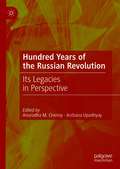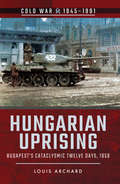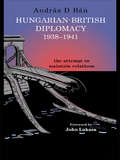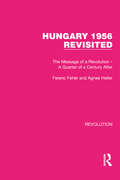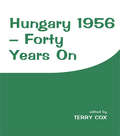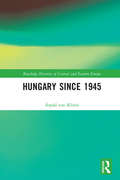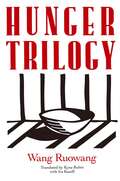- Table View
- List View
Humanizing Immigration: How to Transform Our Racist and Unjust System
by Bill Ong Hing&“Incisive and compelling, reflecting the painful wisdom and knowledge that Bill Ong Hing has accrued over the course of fifty years..." --Michelle Alexander, author of The New Jim CrowFirst book to argue that immigrant and refugee rights are part of the fight for racial justice; offers a humanitarian approach to reform and abolition.Representing non-citizens caught up in what he calls the immigration and enforcement &“meat grinder&”, Bill Ong Hing witnessed their trauma, arriving at this conclusion: migrants should have the right to free movement across borders—and the right to live free of harassment over immigration status.He cites examples of racial injustices endemic in immigration law and enforcement, from historic courtroom cases to the recent treatment of Haitian migrants. Hing includes histories of Mexican immigration, African migration and the Asian exclusion era, all of which reveal ICE abuse and a history of often forgotten racist immigration laws.While ultimately arguing for the abolishment of ICE, Hing advocates for change now. With fifty years of law practice and litigation, Hing has represented non-citizens -- from gang members to asylum seekers fleeing violence, and from individuals in ICE detention to families at the US southern border seeking refuge.Hing maps out major reforms to the immigration system, making an urgent call for the adoption of a radical, racial justice lens. Readers will understand the root causes of migration and our country&’s culpability in contributing to those causes.
Humanizing the Digital Economy: Connecting Religious Humanism with Platforms for a Collaborative Society
by Victor GlassThe Coding Revolution—a combination of the Digital Revolution and genetic engineering—has had a destructive effect on society. It has created a platform for extreme views that is loosening our economic, cultural, and political moorings. This book provides a systematic approach to policy and management to promote societal collaboration and unity. It describes the changes caused by the Digital Age, including the Internet, Artificial Intelligence, and various other technologies. The author then offers a new framework, Religious Humanism, which incorporates covenants of the Bible, the US Constitution and other sources of wisdom to foster collaboration and create a revitalized and inclusive global society. Narrative and analytical tools are offered as well as case examples.
Humanizing the High-Rise City: Podiums, Plazas, Parks, Pedestrian Networks, and Public Art
by Kheir Al-KodmanyThe transformative power of urban design in shaping our experiences within high-rise cities takes center stage in Humanizing the High-Rise City: Podiums, Plazas, Parks, Pedestrian Networks, and Public Art. This captivating exploration delves into the art of turning towering skyscraper cities into vibrant havens that foster human connection, celebrate culture, and build communities. Unveiling the secrets behind the creation of urban spaces, from dynamic plazas that encourage social interaction to tranquil parks that infuse life into steel and glass, the book unfolds a narrative that resonates with the innate rhythms of humanity. Examining 20 major high-rise cities worldwide (including Chicago, New York City, Dubai, Shanghai, Hong Kong, and Singapore, among others), synthesizing extensive literature, and enriched with over 200 photographs, this book showcases projects seamlessly weaving nature, art, and connectivity into the urban fabric. These endeavors craft environments that enhance well-being and instill a profound sense of belonging amid the challenges of urban density. As the global landscape increasingly tilts toward vertical living, this book serves as a guiding light, illuminating the path to a heightened and enriched experience of high-rise urban living. This book will be useful to practitioners and students of architecture, urban planning, and urban design interested in improving high-rise cities.
Humankind: Solidarity with Non-Human People
by Timothy MortonA radical call for solidarity between humans and non-humansWhat is it that makes humans human? As science and technology challenge the boundaries between life and non-life, between organic and inorganic, this ancient question is more timely than ever. Acclaimed Object-Oriented philosopher Timothy Morton invites us to consider this philosophical issue as eminently political. It is in our relationship with non-humans that we decided the fate of our humanity. Becoming human, claims Morton, actually means creating a network of kindness and solidarity with non-human beings, in the name of a broader understanding of reality that both includes and overcomes the notion of species. Negotiating the politics of humanity is the first and crucial step to reclaim the upper scales of ecological coexistence, not to let Monsanto and cryogenically suspended billionaires to define them and own them.From the Trade Paperback edition.
Humans Need Not Apply: A Guide to Wealth & Work in the Age of Artificial Intelligence
by Jerry KaplanAn &“intriguing, insightful&” look at how algorithms and robots could lead to social unrest—and how to avoid it (The Economist, Books of the Year). After decades of effort, researchers are finally cracking the code on artificial intelligence. Society stands on the cusp of unprecedented change, driven by advances in robotics, machine learning, and perception powering systems that rival or exceed human capabilities. Driverless cars, robotic helpers, and intelligent agents that promote our interests have the potential to usher in a new age of affluence and leisure—but as AI expert and Silicon Valley entrepreneur Jerry Kaplan warns, the transition may be protracted and brutal unless we address the two great scourges of the modern developed world: volatile labor markets and income inequality. In Humans Need Not Apply, he proposes innovative, free-market adjustments to our economic system and social policies to avoid an extended period of social turmoil. His timely and accessible analysis of the promises and perils of AI is a must-read for business leaders and policy makers on both sides of the aisle. &“A reminder that AI systems don&’t need red laser eyes to be dangerous.&”—Times Higher Education Supplement &“Kaplan…sidesteps the usual arguments of techno-optimism and dystopia, preferring to go for pragmatic solutions to a shrinking pool of jobs.&”—Financial Times
Humans: A Monstrous History
by Surekha DaviesA history of how humans have created monsters out of one another—from our deepest fears—and what these monsters tell us about humanity's present and future. Monsters are central to how we think about the human condition. Join award-winning historian of science Dr. Surekha Davies as she reveals how people have defined the human in relation to everything from apes to zombies, and how they invented race, gender, and nations along the way. With rich, evocative storytelling that braids together ancient gods and generative AI, Frankenstein's monster and E.T., Humans: A Monstrous History shows how monster-making is about control: it defines who gets to count as normal. In an age when corporations increasingly see people as obstacles to profits, this book traces the long, volatile history of monster-making and charts a better path for the future. The result is a profound, effervescent, empowering retelling of the history of the world for anyone who wants to reverse rising inequality and polarization. This is not a history of monsters, but a history through monsters.
Humboldt Revisited: The Impact of the German University on American Higher Education (Higher Education in Critical Perspective: Practices and Policies #7)
by Gry Cathrin BrandserHumboldt Revisited offers a fresh perspective on the contemporary discourse surrounding reform of European universities. Arguing that contemporary reform derives its basis from pre-constructed truths about the so-called ‘Humboldt-university,’ this monograph traces the historical descent of these truths to the American reception of Humboldt's ideas from the mid-19th century up until the 1960s. Drawing from a rich selection of historical sources, this volume offers an alternative to conventional explanations of the forces behind the ongoing reform of European universities. It also challenges the conventional historical narrative on the Humboldt University, providing new insight into the American reception of the German ideas.
Hume and the Politics of Enlightenment
by Thomas W. Merrill"Methinks I am like a man, who having narrowly escap'd shipwreck," David Hume writes in A Treatise of Human Nature, "has yet the temerity to put out to sea in the same leaky weather-beaten vessel, and even carries his ambition so far as to think of compassing the globe. " With these words, Hume begins a memorable depiction of the crisis of philosophy and his turn to moral and political philosophy as the path forward. In this groundbreaking work, Thomas W. Merrill shows how Hume's turn is the core of his thought, linking Hume's metaphysical and philosophical crisis to the moral-political inquiries of his mature thought. Merrill shows how Hume's comparison of himself to Socrates in the introduction to the Treatise illuminates the dramatic structure and argument of the book as a whole, and he traces Hume's underappreciated argument about the political role of philosophy in the Essays.
Hume's Politics: Coordination and Crisis in the History of England
by Andrew SablHume's Politics provides a comprehensive examination of David Hume's political theory, and is the first book to focus on Hume's monumental History of England as the key to his distinctly political ideas. Andrew Sabl argues that conventions of authority are the main building blocks of Humean politics, and explores how the History addresses political change and disequilibrium through a dynamic treatment of coordination problems. Dynamic coordination, as employed in Hume's work, explains how conventions of political authority arise, change, adapt to new social and economic conditions, improve or decay, and die. Sabl shows how Humean constitutional conservatism need not hinder--and may in fact facilitate--change and improvement in economic, social, and cultural life. He also identifies how Humean liberalism can offer a systematic alternative to neo-Kantian approaches to politics and liberal theory. At once scholarly and accessibly written, Hume's Politics builds bridges between political theory and political science. It treats issues of concern to both fields, including the prehistory of political coordination, the obstacles that must be overcome in order for citizens to see themselves as sharing common political interests, the close and counterintuitive relationship between governmental authority and civic allegiance, the strategic ethics of political crisis and constitutional change, and the ways in which the biases and injustices endemic to executive power can be corrected by legislative contestation and debate.
Humility: An Unlikely Biography of America's Greatest Virtue
by David J. BobbThere is no formula for becoming humble--not for individuals, and not for nations. Benjamin Franklin's dilemma--one he passed on to the young United States--was how to achieve both greatness and humility at once. The humility James Madison learned as a legislator helped him to mold a nation, despite his reputation as a meek, timid, and weak man. The humility of Abigail Adams fed her impossible resilience. Humility of all kinds is deeply ingrained in our American DNA. Our challenge today is to rediscover and reawaken this utterly indispensable, alarmingly dormant national virtue before it's too late. In Humility: An Unlikely Biography of America's Greatest Virtue, Dr. David J. Bobb traces the "crooked line" that is the history of humility in political thought. From Socrates to Augustine to Machiavelli to Lincoln, passionate opinions about the humble ruler are literally all over the map. Having shown classical, medieval, and Christian ideas of humility to be irreconcilable, Dr. Bobb asserts that we as a nation are faced with a difficult choice. A choice we cannot put off any longer. "The power promised by humility is power over oneself, in self-government," says Dr. Bobb. "[But] humility's strength is obscured by the age of arrogance in which we live." George Washington's humility, as great as it was, cannot substitute for ours today. We must reintegrate this fundamental virtue if there is to be an American future. The rediscovery of humility's strength awaits."Humility is essential to good character--and to our country. In this smart and lively book, David Bobb illustrates this virtue with the stories of five great Americans. And he reminds us that humility is at the core of our national creed of equality and liberty."--Paul Ryan"Nothing defies political correctness and the prevailing zeitgeist as radically as the notion that humility remains an important virtue. Dr. Bobb not only makes the case for this dismissed and disregarded value but emphasizes its importance as part of the American national character."--Michael Medved, syndicated talk radio host"A lively and counterintuitive argument, spiced with witty prose and engaging vignettes of Franklin, Washington, Madison, Lincoln, Frederick Douglass, and Abigail Adams."--Robert Faulkner, professor of Political Science, Boston College; author, The Case for Greatness"Dr. David Bobb has written a timely and timeless book on a vital virtue absent from far too many leaders today. Humility should be required reading for leaders in the public and private sector as well as in our homes and communities. In an age of arrogance there is much to be learned and strength to be gained from returning to the principle, power and pattern of humility contained in this extraordinary book." --Mike Lee, U.S. Senator, Utah
Hummingbird in Underworld: Teaching in a Men's Prison, A Memoir
by Deborah TobolaAt the age of forty-five, Deborah Tobola returns to her birthplace, San Luis Obispo, to work in the very prison her father worked in when he was a student at Cal Poly. But she&’s not wearing a uniform as he did; she&’s there to teach creative writing and manage the prison&’s arts program—a dream job. As she creates a theatre program for prisoners, Tobola finds plenty of drama off the stage as well. Inside the razor wire she finds a world frozen in the &’50s, with no contact with the outside except by telephone; officers who think prisoners don&’t deserve programs; bureaucrats who want to cut arts funding; and inmates who steal, or worse. But she loves engaging prisoners in the arts and helping them discover their voices: men like Opie, the gentleman robber; Razor, the roughneck who subscribes to The New Yorker; charismatic Green Eyes, who really has blue eyes; Doo Wop, a singer known for the desserts he creates from prison fare. Alternating between tales of creating drama in prison and Tobola&’s own story, Hummingbird in Underworld takes readers on an unforgettable literary journey—one that is frank, funny, and fascinating.
Humor in Uniform: Funny True Stories about Life in the Military
by Editors of Reader's DigestIf laughter is the best medicine, then look no further to cure whatever ails you. The column “Offbase,” formally known as “Humor in Uniform,” has appeared in the Reader's Digest magazine for over half a century, and has published more than 3,500 jokes, quotes, and funny stories from the more than a million readers who have submitted them. This volume—from the world’s #1 source of humor—contains laugh-out-loud gems from one of Reader’s Digest’s most popular columns.<p> This side-splitting collection of humor delivers hundreds of the best jokes, anecdotes, cartoons, quotes, and stories from men and women in the armed forces or their families proving that life is often funnier than fiction.
Humor of a Country Lawyer
by Sam J. ErvinOriginally published in 1984, Senator Ervin's delightful collection of stories and anecdotes winds its way from his native Morganton through Chapel Hill and Harvard, the military, the North Carolina Supreme Court, the United States Senate, and Watergate. It represents a lifetime of wit and wisdom--told in the late Senator Ervin's inimitable style.
Humour and Politics in Africa: Beyond Resistance
by Daniel Hammett Laura S. Martin Izuu NwankwọAnalyses of humour often focus primarily on the Global North, with little consideration for examples and practices from elsewhere. This book provides a vital contribution to humour theory by developing a Global South perspective. Taking a wide-ranging view across the whole of the continent, the book examines the relationship between humour and politics in Africa. It considers the context of the production and reception of humour in African contexts and argues that humour is more than just symbolic. Moving beyond the idea of humour as a mode of resistance, the book investigates the ‘political work’ that humour does and explores the complex entanglements in which the politics, practices and performances of humour are located.
Humour and the Performance of Power in South Asia: Anxiety, Laughter and Politics in Unstable Times
by Sasanka Perera Dev Nath PathakThis book critically examines the role and politics of humour and the performance of power in South Asia. What does humour do and how does it manifest when lived political circumstances experience ruptures or instability? Can humour that emerges in such circumstances be viewed as a specific narrative on the nature of democracy in the region? Drawing upon essays from India, Sri Lanka and Bangladesh, this volume discusses many crucial historical and contemporary themes, including dance-drama performances in northern India; caste and stand-up comedy in India; cartoon narratives of citizens’ anxieties; civic participation through social media memes in Sri Lanka; media, politics and humorous public in Bangladesh; the politics of performance in India; and the influence of humour and satire as political commentaries. The volume explores the impact of humour in South Asian folklore, ritual performances, media and journalism, and online technologies. This topical and interdisciplinary book will be essential for scholars and researchers of cultural studies, political science, sociology and social anthropology, media and communication studies, theatre and performance studies, and South Asian studies.
Hun Sen's Cambodia
by Sebastian StrangioTo many in the West, the name Cambodia still conjures up indelible images of destruction and death, the legacy of the brutal Khmer Rouge regime and the terror it inflicted in its attempt to create a communist utopia in the 1970s. Sebastian Strangio, a journalist based in the capital city of Phnom Penh, now offers an eye-opening appraisal of modern-day Cambodia in the years following its emergence from bitter conflict and bloody upheaval. In the early 1990s, Cambodia became the focus of the UN’s first great post#150;Cold War nation-building project, with billions in international aid rolling in to support the fledgling democracy. But since the UN-supervised elections in 1993, the nation has slipped steadily backward into neo-authoritarian rule under Prime Minister Hun Sen. Behind a mirage of democracy, ordinary people have few rights and corruption infuses virtually every facet of everyday life. In this lively and compelling study, the first of its kind, Strangio explores the present state of Cambodian society under Hun Sen’s leadership, painting a vivid portrait of a nation struggling to reconcile the promise of peace and democracy with a violent and tumultuous past.
Hundred Years of the Russian Revolution: Its Legacies in Perspective
by Anuradha M. Chenoy Archana UpadhyayThe book reflects upon the Russian Revolution of 1917 and the ensuing developments in Russia, the rest of the former Soviet Union, Central and Eastern Europe and elsewhere in the world. It discusses the impact of the legacies of the Russian Revolution on political systems, ideologies, economic and social structures and culture. The book answers some pertinent questions: To what extent are these legacies relevant today for the contextualisation of memory politics, social institutions, and international relations? How does an analysis of 1917 and its legacies contribute to the comparative study of revolutions and social change?
Hungarian Uprising: Budapest's Cataclysmic Twelve Days, 1956 (Cold War, 1945–1991)
by Louis ArchardWhen the world held its breath It is more than 25 years since the end of the Cold War. It began over 75 years ago, in 1944 long before the last shots of the Second World War had echoed across the wastelands of Eastern Europe with the brutal Greek Civil War. The battle lines are no longer drawn, but they linger on, unwittingly or not, in conflict zones such as Syria, Somalia and Ukraine. In an era of mass-produced AK-47s and ICBMs, one such flashpoint was Hungary Soviet troops had occupied Hungary in 1945 as they pushed towards Germany and by 1949 the country was ruled by a communist government that towed the Soviet line. Resentment at the system eventually boiled over at the end of October 1956. Protests erupted on the streets of Budapest and, as the violence spread, the government fell and was replaced by a new, more moderate regime. However, the intention of the new government to withdraw from the Warsaw Pact and declare neutrality in the Cold War proved just too much for Soviet leader Nikita Khrushchev.Soviet forces had intervened at the beginning of events to help the former regime keep order but were withdrawn at the end of October, only to return in November and quell the uprising with blunt force. Thousands were arrested, many of whom were imprisoned and more than 300 executed. An estimated 200,000 fled Hungary as refugees. Despite advocating a policy of rolling back Soviet influence, the US and other western powers were helpless to stop the suppression of the uprising, which marked a realization that the Cold War in Europe had reached a stalemate.
Hungarian-British Diplomacy 1938-1941: The Attempt to Maintain Relations
by András D. BánThis book deals with the relationship between Britain and Hungary during the crucial years 1938-1941. In addition to archival research in London and Budapest, mostly about the relations of the governments, Bán's work broadens into political, social, intellectual and cultural history. This is one of its exceptional assets, including materials hitherto overlooked or disregarded, as it relates to more than diplomatic history - even though, in dealing with the latter too, Bán's mastery of archival and other evidence is extraordinarily valuable.
Hungary 1956 Revisited: The Message of a Revolution – A Quarter of a Century After (Routledge Library Editions: Revolution #14)
by Agnes Heller Ferenc FehérThis book, first published in 1983, is a radical reinterpretation of the Hungarian revolution in the context of world politics and Eastern Europe as a whole. It examines the events and protagonists with a fresh eye, and relies on witnesses and participants for the rigorous documentary backing.
Hungary 1956: Forty Years On
by Terry CoxThis collection of new articles offers a retrospective view of the events of the 1956 revolution in Hungary, the consequences they have had for Hungary's political development since, and the significance of 1956 in current Hungarian politics. Different articles draw on the findings of various kinds of research, including work in documentary and archival collections that have only recently been opened up, sociological survey research, and in some cases, on personal reminiscences as well.
Hungary since 1945 (Routledge Histories of Central and Eastern Europe)
by Árpád von KlimóLying on the political fault line between East and West for the past seventy-five years, the significance of Hungary in geopolitical terms has far outweighed the modest size of its population. This book charts the main events of these tumultuous decades including the 1956 Uprising, the end of Hungarian communism, entry into the European Union and the rise to power of Viktor Orbán and the national-conservative ruling party Fidesz.
Hunger
by Barbara Milbauer Gerald LeinwandThis book studies the millions of Americans trapped in a self-perpetuating state of poverty and malnutrition, whose only hope for the future has become tangled in political red tape.
Hunger Trilogy
by Wang Ruowang Kyna Rubin Ira KasoffThis autobiographical novella was written in 1980 by one of China's leading dissidents, who was released from jail in late October 1990 again after being imprisoned as a pro-democracy activist in the wake of the Tiananmen incident of spring 1989. Wang recounts three episodes of extreme hardship in his life: incarceration in a Guomindang jail during the 1930s for his communist activism, on the run from Japanese troops during the 1940s in a bleak part of Shandong Province, and imprisonment as a "rightist" in Shanghai during the 1960s cultural revolution. The central theme of the three stories is extreme deprivation and "Hunger".

